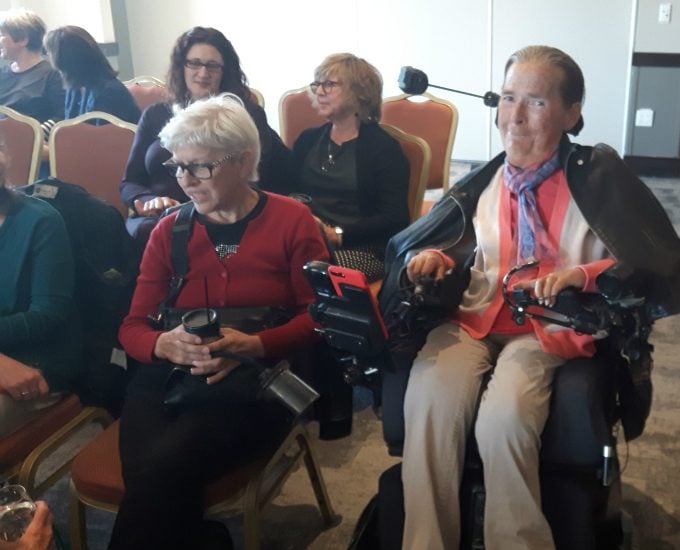KJIPUKTUK (Halifax) – If you want to understand why people with intellectual disabilities continue to be warehoused in large institutions you need to consider both austerity and ableism.
That was the message delivered by noted scholar Catherine Frazee, a retired Ryerson disability studies professor, activist, poet and writer who now lives in the Annapolis Valley.

Frazee testified at the ongoing Nova Scotia Human Rights enquiry that looks at government’s inability to provide adequate supported community living opportunities for people who live with intellectual and/or other disabilities.
In Nova Scotia people who are institutionalized have little hope of finding community-based accommodations. Meanwhile many parents worry about becoming too old to look after their children with intellectual disabilities, who out of necessity still live with them.
Imagine the upset if able-bodied people were treated like that, said Frazee. That this is happening to people with complex care needs instead is no coincidence.
Able-bodied people are viewed as productive, hardworking and competitive members of society. In contrast, people with disabilities are perceived as dependent, unproductive, and without value.
Ableism is the term that describes this unconscious tendency to consider able-bodied people the norm, and people with disabilities as deviating from that norm, and somehow of lesser value. Like sexism and racism, ableism diminishes the perspectives of others, Frazee said.
Austerity comes into play when you consider that it is much cheaper to either warehouse people, or have them live with parents or loved ones, rather than provide them with the complex supports required for community living. It almost becomes like a cost-benefit analysis, Frazee said.
Indeed, more than 1,000 people are on a wait list for a different housing option. The eight small option homes that government announced for the next fiscal year are a mere drop in a bucket, especially if one considers that many more people are in need of accommodation than these official numbers suggest. Why bother putting your name in when you’ll never reach the top anyway?
Frazee also spoke also about the negative effects of living for extended periods in large institutions, disempowered and segregated from society. It silences you, she said, it makes the muscle of self expression atrophy.
This was day 14 of a human rights enquiry that promises to be lengthy and could have immense consequences for people with intellectual disabilities and people living in poverty in Nova Scotia.
In a nutshell, the argument is that Community Services is acting in a discriminatory way based on disability because it provides immediate housing supports to people on welfare, in the form of a shelter allowances, but does not offer effectively similar housing supports for people who are equally poor but whose needs are more complex.
The case centres around Joseph Delaney and Beth MacLean, who for over a decade were housed at Emerald Hall, a locked psychiatric ward in the Nova Scotia Hospital, although this was in no way warranted by their disabilities. It just happened to be cheaper.
See also:
- Community Services dragging its feet in Emerald Hall human rights case, says community living advocate
- News release: Human Rights hearing begins about Province’s provision of supportive housing
If you can, please support the Nova Scotia Advocate so that it can continue to cover issues such as poverty, racism, exclusion, workers’ rights and the environment in Nova Scotia. A paywall is not an option for us, since it would exclude many readers who don’t have any disposable income at all. We rely entirely on the kindness of occasional one-time donors and a small group of loyal monthly sustainers.




There were two references made in the above article on the Human Rights Inquiry to it being cheaper to warehouse people in institutions/hospitals. I believe the statistics show that it is in fact more expensive to keep someone in a large institution than in a community home. This alone should inspire the government to move faster on making it possible for more people to live in community.
You may be right, Kathleen. I believe we may hear more about this at the tribunal sometime in the near future. I will write about it then for sure, if not before.
The sad reality is the shelter allowance is $535.00 for many who are on income assistance. For some, if not many others on income assistance the shelter allowance is only $300.00. The personal allowance is only $275.00 and lots, if not many income assistance recipients are dipping into that $275.00 to top their rent. Sadly included with the population amount of income assistance recipients who are doing that are persons with disabilities. Sadly it is landlords raising the rents sky high that causes this to happen.